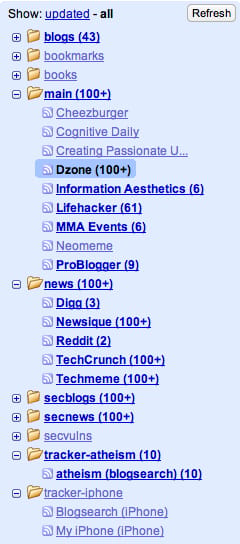How To Effectively Manage and Process Your RSS Feeds [GTD]

[ PUBLISHED: Jun 1, 2007 ]
Those of us who use RSS > tend to struggle constantly with two impulses: 1) the drive to reduce your information inputs in order to focus more on output, and 2) the urge to seek out additional stuff that you’ll likely end up pruning later in step 1.
But even after people settle on a good set of feeds, people usually spend far too long reading them every day, and just looking at an unruly mass of unread items is enough to stress you out. Most don’t feel their feeds are organized, don’t know which ones they should be reading at any given time. But there’s a solution.
Organize your feeds into groups based on the time you have available to read them. Separate current-events and work-related content from specialized and personal content. This way you can take in your feeds in more manageable chunks based on where you are.
[ NOTE: My feeds configured using Google Reader >. ]
Examples
Blogs
What: Personal blogs, any sites where the personality of the site’s author(s) come through.When: Every 1-3 days, after hours and during breaks.
Bookmarks
What: Here I subscribe to all my friends’ and associates’ bookmarks through del.icio.us.When: As they come in, after hours. This is a discovery activity, meaning I’m using them to find new stuff to learn.
Books
What: Here I subscribe to popular book lists, such as the New York Times bestseller list, friends/associates reading on LibraryThing >, etc.When: As they come in, after hours. Again, this is about expanding, which isn’t done during time crunches.
News
What: This is where you put your primary news feeds, i.e. the ones you use to stay up to date on current events, industry news, etc. Don’t put any specialized feeds here that aren’t necessary for current events or work. This folder is for acquiring knowledge about current events that may help you during the day. Think about putting pre-aggregated feeds in here, like Techmeme, Techcrunch, etc. in order to save time.When: This I usually read every day upon arriving to work, and possibly again during breaks and lunch.
Main
What: This is where you put most of your feeds. This is your general folder. The catch-all. Science feeds, comic feeds, specialized news-sites, non-personal blogs that you follow — whatever.When: Usually at least once a day — after hours.
SecBlogs
What: This is where I put my security blogs. This is a good folder for specialized industry sites that you follow. As with blogs vs. main, I differentiate between a security blog and a security site by how much of a personal feel the site has to it. If it’s a lot, it’s a blog; if it’s more like a list of stories, I put it under Secnews.When: Once every 1-3 days usually at the beginning of the work day while I’m reading news. Security is a philosophical discipline, so it’s important to follow what people are discussing within the field. It helps you to cultivate your own ideas.
SecNews
What: Security content that doesn’t fall under News or SecurityBlogs. I put a lot of the big security aggregation feeds in here. SecGuru, Altavista, etc.When: Every day along with my news. In fact, sometimes I’ll read this folder and skip the regular news. It just depends on how I feel and whether or not I’m going to possibly need to discuss some current events in the space.
SecVulns
What: All your vulnerability feeds. Enough said.When: This depends on what kind of work I’m doing. If I’m doing heavy security testing at the time I’ll be in this often. If not, I’ll pick up the major ones from the SecNews folder.
Trackers
What: I use these folders to track certain things I’m interested in. Currently one such topic is the iPhone >. So what you put in the folder is various ways of following what’s being said about your given subject. For example, for the iPhone tracker I’m currently following an iPhone blog called My iPhone, and the Google Blog Search results > for the term. Other ideas include ego searches for your own name and/or searches for your friends’ names.When: As they come up, after hours.
Conclusion
When you organize your feeds in this way you help remove the stress of not knowing if you read "enough". This is something of a GTD > approach to things — allowing you to read the appropriate folders according to what frame of mind you’re in at the time, and how much time you have to spend. In short, read the folders that you have time for, and close your reader. Done.
This is GTD-like because it allows you to develop trust in your method, which eliminates stress and allows you to focus on what you’re doing. Without this approach many constantly fret about whether or not they’ve missed something important.
I find this system helps me greatly, and I hope it will help you as well. If you have any comments, questions, or recommendations on how to improve this system I’d really love to hear them >.
[ Jun 1, 2007 ]